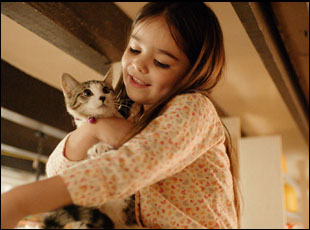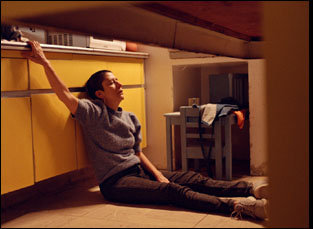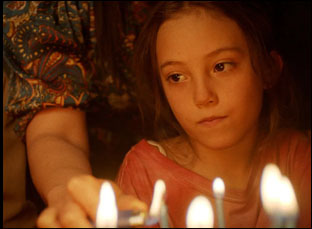Inevitably, the party didn’t last as long as Lila Avilés had hoped while making “Tótem,” but nonetheless it was a moment of celebration. The climatic moment in her second feature was set up to occur in the shooting schedule at the same point in time as it would for the film’s seven-year-old protagonist Sol (Naíma Sentíes), who’s come to her grandparents’ home to spend the day leading up to her father Tona’s (Mateo Garcia) birthday while her mother Lucia (Iazua Larios) is out running errands. The young girl hasn’t seen her father in some time and it’ll be a while longer even after she arrives when he doesn’t have the strength to see visitors and as friends and family begin to accumulate for festivities in the evening, Sol becomes increasingly aware that she’s come to say goodbye at the same time he’s saying hello. It’s a moment that naturally the characters in “Tótem” want to stretch out forever, but so too did its writer/director when what she was witnessing in front of her was so beautiful, any artifice of filmmaking falling away when her cast and crew were simply living in the moment and having a blast.
“I wanted to have more time for the party — every time as a filmmaker, you would like to have more time, but I really loved the energy that was between all the the actors and the crew, we were having so much fun,” recalled Avilés. “Obviously, doing a film is a lot of pressure, but this was almost like going to therapy. It was super profound and I felt just so connected.”
It’s hard to feel anything but inside the cocoon that Avilés’ has created with her brilliant second feature, which at once feels like an refuge as Lucia tucks her daughter away in relative quiet, hoping to keep the details of her father’s health from overwhelming her in the company of loved ones, and at the same time becomes the whole world as Sol’s curiosity leads her into different rooms throughout the house and the day becomes a lifetime. When no effort is spared to give Tona the best birthday possible, with his sister Nuria (Montserrat Maranon) stationed firmly in the kitchen preparing a cake and his mother Alejandra (Marisol Gasé) going so far as to bring a shaman (Marisela Villarreul) into the house to cleanse it of spirits, Sol is left to wander the premises, exposed to the full continuum of the experience of living on earth from the flora and insects that breathe alongside her to all the history reflected on the walls of the home in her father’s paintings and grandparents’ knickknacks that serve as evidence of how they’ve left a mark.
After already making one of her own with 2018’s “The Chambermaid,” an arresting drama about a maid on a futile quest for upward mobility, Avilés has authored one of the finest films in recent memory, capturing the circle of life in a truly all-encompassing way. Able to make time stand still while illustrating the passage of it, the filmmaker makes a day that will be remembered for the rest of Sol’s life equally impressive on an audience as one can come to terms with what is lost along the way while being rejuvenated to see the world as innocently as Sol does. After being honored with an Ecumenical Prize upon its premiere at Berlinale and shortlisted for a Best Foreign Language Oscar, “Tótem” is now arriving in U.S. theaters and on a recent swing through Los Angeles, Avilés spoke about what went into creating such a special film, how it connects to her previous feature and how she sought to make a film that reflected the ties that bind our experiences generally.

It comes from a really personal story and I knew “Tótem” was going to be the second film, [but] I’m super happy that it happened [this way] because some people think both films are different, and it’s like almost two different directors, but I’m happy every single film shows you something else. And “The Chambermaid” is mostly one character, but [while] I knew that it was from the point of view of Sol, the girl, I also knew also that it was going to be a choral film and there are other characters. It’s mostly following [Sol] and always returning to her, but it was more like going back and forth and it will be more chaotic, much more talking with a lot of different characters.
It seems like the connective tissue may be that Gabriela Cartol, your lead in “The Chambermaid,” actually helped you cast this…
Yes, Gabriela is a unique woman, and we love each other so much and have a lot of respect for one another’s work. And I knew this film was all about casting, so I invited her to be with me for this crazy run and she did an amazing job because in this film there’s no landscape — no mountain that can help us [liven things up], so it was all about the characters, and we needed to put attention there.
Is it true you filmed as much as you could in sequence?
Yes, that was the only thing I asked for since the first moment to the producers. Like, “Please, I want to film the more progressive I can, because it’s important not only for Naima, [playing] the main character, Sol, but also for me as director and for all the other characters. We needed to understand the transition of the characters and the process, but I really enjoy that. It makes us go more deeper to the story. And I improvise a lot [along the way], but in the other way, I’m super control freak. I try to do both and to maintain the tone, so that it feels real and naturalistic, but not every single scene needs to have this rhythm that it’s cinema. It’s also a kind of documentary.

We searched a lot of houses, and in Mexico, they film a lot normally in the same houses, so I knew that I wanted a house that was not filmed before. And we found this house and architecture was perfect, but it was without furniture, so we built everything, and I wanted just to have this feeling of being lived in, [where] all the furniture has a story. But the one thing it had was plants, and I loved that the house had that. It was perfect for [this idea] had of a microcosm — to have this micro world of not only the family structure, but also animals plus plants and it was a more interconnected world.
One of the most amusing scenes is when it’s inspected for spirits. Was that actually based on anything you had seen?
That’s a joke, and that actress was in my first film, and she had a super small part, but I thought she was super funny, and I love her so much. She has something special, so I wrote this character for her, thinking “Oh, she’s going to do amazing and she deserves to have a bigger part in ‘Tótem,’” so it was nice to bring her back. She makes [that scene] so wonderful, because obviously, it’s a film about death, but also about joy, and of laughing, and to be emotional.
That idea of duality is laced throughout the film and I was struck in particular by a Paolo Freire quote, describing teaching and learning as the same thing. Was that something that was foundational?
Yes, for me, teachers are the magicians, and it was to have these moments [where] you’re grateful, and you speak from the most profound [areas] of your heart, those moments [where] you can be open and connect. I love that of the party [scene too because] it’s like sometimes we all think that we are in the same way, but it’s not like this. [When] one of her friends [says], “Everything is a spiral, everything changes, it’s your birthday, but it won’t be in the same place. Now that we’re in another year, it’s different” — when we think about those things, we live in a planet [that’s constantly in motion], it gives [us all] a little bit more of awareness.

We have been traveling, [with] more than 70 festivals worldwide, a lot of distribution and I cannot be more grateful. With my first film I told [myself], it was a dream to be a filmmaker and I could [say], “Yes, now I’m a filmmaker,” and with this second film, what is beautiful is that I’m a little bit more mature, and you understand the good, the bad, and to appreciate doing what I love because I know not all the people have that experience. It’s such a unique and beautiful work — filmmaking — and I just love so much to be a filmmaker, so it’s nice what all has happened to the film because it also [encourages] you to continue doing it, like, “Just go girl. That’s it.”
“Tótem” is now playing in New York at Film Forum and will open on February 2nd in Austin at the AFS Cinema where Avilés will be on hand for a Q&A after the 3:45 pm screening on February 3rd, and Los Angeles at the Monica Film Center and Laemmle Glendale. It will expand to more cities on February 9th and a full list of theaters and dates can be found here.




